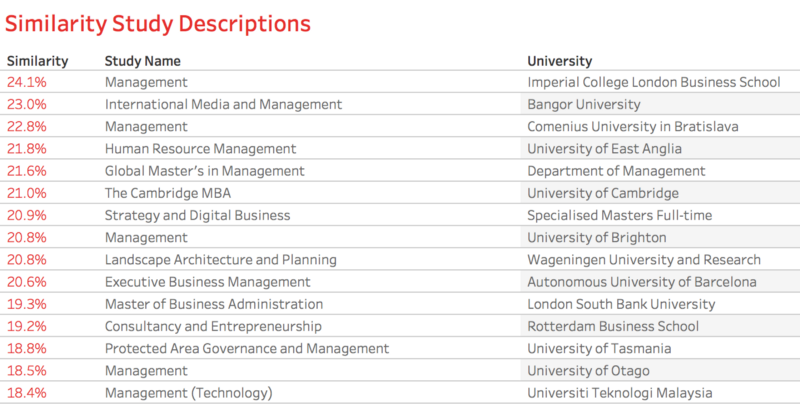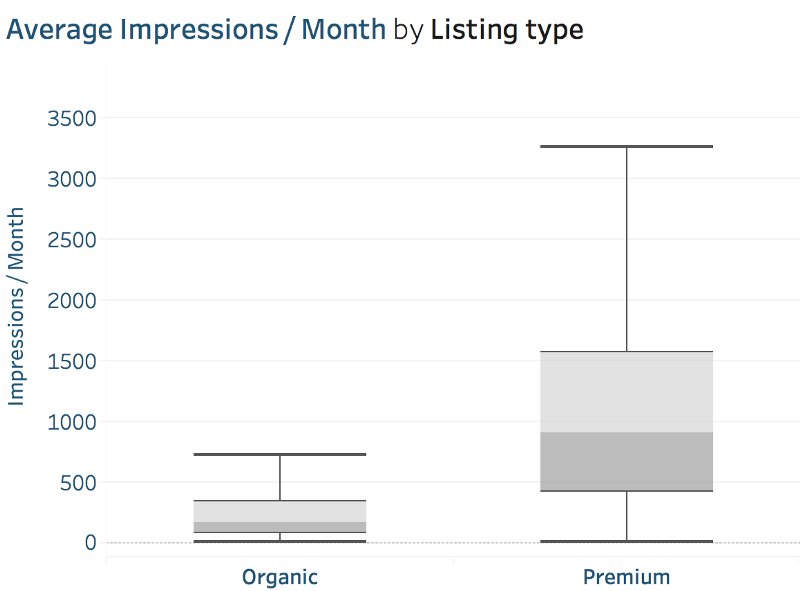All about the words: How to maximise traffic to your programmes
Case study: Using big data to find the best name for a Master’s degree in Management
To be found online, you have to be visible first. This idea may be straightforward but in reality, is much more complex. Choosing the right words to describe your university programmes can make or break your online search strategy. It not only affects whether a webpage shows in Google’s search results, it also influences whether prospective students are likely to click through and visit your university website.
To help advertisers run successful campaigns, Google developed a tool called the Keyword Planner. To help universities reach the right students, Studyportals’ ACT team developed the Programme Name Optimiser. This data-driven tool provides insights into search trends, competition and conversion rates for common combinations of words based on actual student behaviour on our portals.
In this case study we provide an example of how a university that wants to set up a brand new management degree, but still has to decide upon the study name and description, can benefit from using this tool.
The naming challenge
The programme name and description are one of the few ways in which educational institutions can distinguish themselves from one another.
Ideally, you strive for a study name that covers the subject well, and at the same time encompasses the field interest of a large student set. In this example, there are plenty of options to choose from: International Management, Global Master in Management, Strategic Management, Business Management, Business Administration, and the list goes on.
Based on our research, we identified 3 criteria the new study name must satisfy in order to be considered:
-
- Lift Factor: high degree of popularity for a search term.
- Target Audience Alignment: keywords your target audience is searching for.
- Subdiscipline Fit: alignment between the programme and subdiscipline.
Programme Name recommendation
Combining the results from applying the three criteria above, we can conclude that “International Business” is the preferred choice for a British target audience in terms of lift factor, conversion rate and subdiscipline fit.
Programme Description recommendation
Aside from the name of a programme, the Programme Name Optimiser hints at words and phrases your competitors are regularly using in their study description. These insights can be used to write a relevant, yet unique study description which in turn boosts your search rank (see FAQ below).
Furthermore, you can compare the description of your programmes to those of similar-scope programmes offered by other institutions in terms of how similar or different they are.
The larger the font size, the higher the competition for that search phrase.
Programmes using similar terminology as the investigated study programme.
Summary
In this case study, we have demonstrated how a university can form data-driven decisions about the preferred programme name for a management master (“International Business”), corresponding sub-discipline (“Management, Organisation and Leadership”) and which words to use in the programme description to improve the visibility and search results rank of the program while also being relevant for its target audience.
Please try playing around with the dashboard and see what it can do for you. However, please realise that the current dashboard does not provide insights on all 180 sub-disciplines nor does it provide any insight per country. For any questions or comments on this dashboard and on the details of customising the dashboard to your needs, such as sub-disciplines, historic trends, live data, etc., please do not hesitate to contact us at consulting@studyportals.com.
Frequently Asked Questions
How does the methodology work?
The general principle of the keyword analysis relies on natural language processing (NLP) techniques which identify common groupings of words (i.e. tokens) in a series of related programme names. For example, both “International Business and Management” and “International Management” are classified as “International” (n=318) as well as “Management” (n=1633). In this way, conclusions are drawn based on larger sample sizes which in turn makes the results less prone to outliers. Furthermore, measures have been taken to control for seasonality effects and promoted search results.
How does Studyportals’ search algorithm work?
Studyportals’ main objective is to help students find the programmes which fit their background and aspirations best.
The search algorithm ensures that, if the programme content is closely related and relevant to the student’s search, it has a higher chance of appearing at the top of the search results.
Besides the relevance of content in the title, summary and description itself, the algorithm considers quality, freshness and uniqueness of the programme information.
For the programmes of our partner universities, a premiumness coefficient is applied that favours a listing among other listings with similar relevance.
How does a study programme become more visible to students?
In addition to the study name and description, the search results rank will have an enormous impact on the visibility of a study programme. As becomes clear from the boxplots below, premium management Master’s get between 3 and 5 times more impressions per month than organic listings. Based on the study discipline you are interested in, the Programme Name Optimiser will provide a tailor-made estimate of the expected results of a promoted campaign









